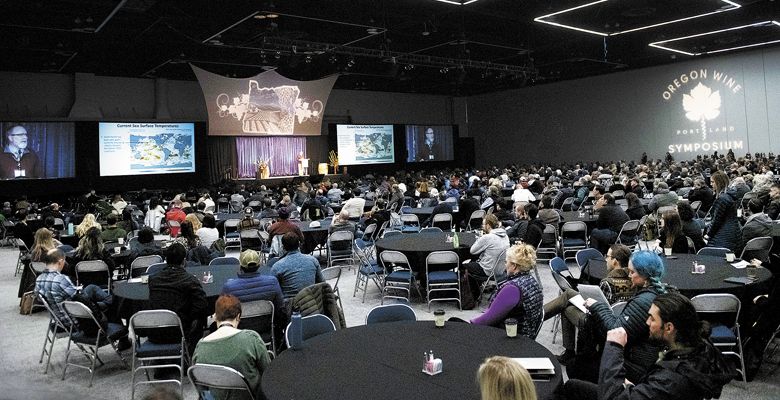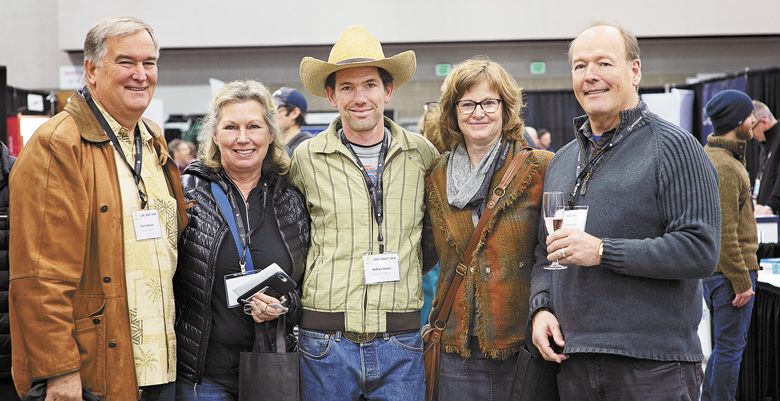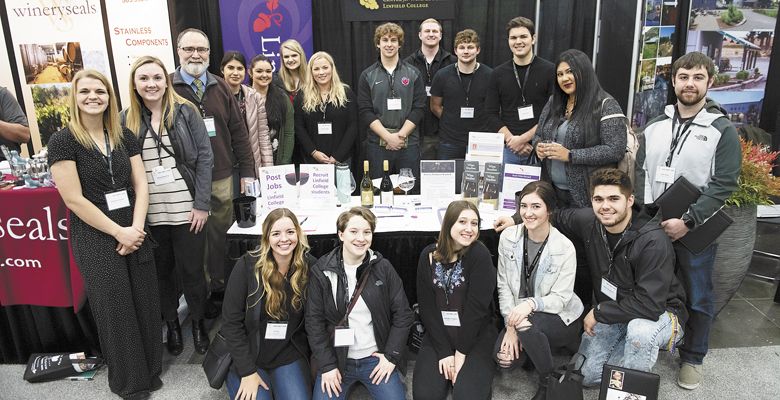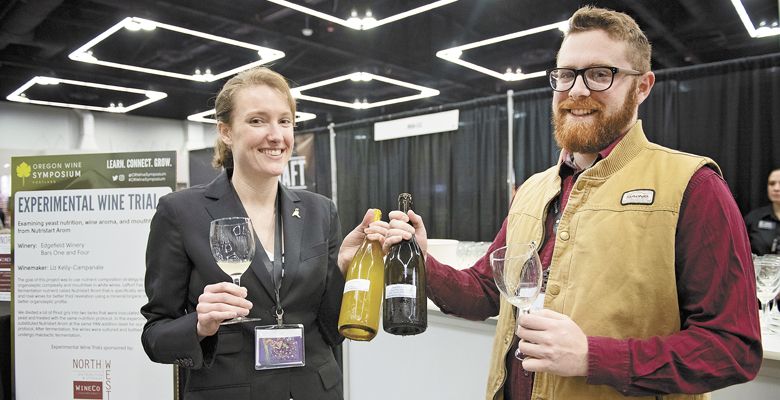Symposium 2019
OWB presents industry studies stratagem
The Awards
Members honored at 2019 annual meeting
By OWP Staff
Oregon’s wine community recognized its peers at a moving awards ceremony luncheon held the final day of the 2019 Oregon Wine Symposium, which was held at the Oregon Convention Center in Portland, Feb. 12 and 13.
More than 1,500 wine industry professionals celebrated the accomplishments of colleagues throughout the state who continue to champion the advancement of Oregon wine. Nine awards were given.
Justin King, board member of the Oregon Winegrowers Association (OWA) and King Estate Winery presented the Oregon Wine Leadership Award to Rep. Paul Holvey and Sen. Arnie Roblan, longtime legislators advancing issues important to the Oregon wine industry.
Kristin Marchesi of Montinore Estate presented the Industry Leadership Award to Alison Sokol Blosser; she was recognized for her tireless support of the industry, including her role as past president of Oregon Pinot Camp.
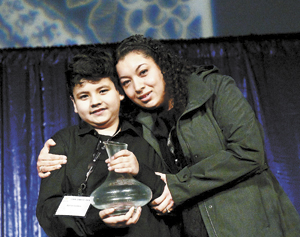
Jana McKamey, OWA vice president of government affairs, presented the Industry Partner Award to Dan Jarman, president and founder of Crosswater Strategies, serving as political advisor to OWA since 2010.
Ed Burke of King Estate presented the Vineyard Excellence Award to vineyard manager Meliton Martinez. He began working as a field hand at King Estate at 19, 35 years ago; he now manages more than 450 acres of vines, overseeing the conversion of King Estate’s farming practices to achieve Biodynamic certification.
John Pratt, OWB chairman emeritus, presented the Founders Award to Matthew Thompson of Domaine Serene, who accepted it on behalf of owners Ken and Grace Evenstad.
Pratt also presented the Board Service Awards to OWB chairman emeritus Steve Thomson of Cristom Vineyards and Silvan Ridge Winery’s JP Valot.
The ceremony wrapped with a stirring tribute to the late Jesús Guillén. OWB Board member and Abbey Creek Winery founder Bertony Faustin presented the Lifetime Achievement Award with a moving video on Guillén’s life, family and winemaking career. Guillén was winemaker at White Rose Estate and founder of Guillén Family Wines. After the video, his wife Yuliana Guillén accepted the award as the applauding crowd rose to its feet.
Research Priorities
OWB presents industry studies stratagem
By Maureen Battistella
After a year of planning, consultation and analysis, the Oregon Wine Board released strategic priorities to guide future research funding at the 2019 Oregon Wine Symposium in Portland last month. Wine quality, sustainable production, changing climate and foundational research all were mentioned. OWB’s 2018/19 budget allocation to research is nearly $450,000, growing from about $140,000 in 2005/2006.
The OWB, established by a state statute in 2003 “for the purpose of supporting enological, viticultural and economic research to develop sustainable business practices for wine grape growing and wine making within Oregon and supporting the promotion of Oregon’s wine grape growing and winemaking industries.” The entity is funded by a producer tax on wine grapes at the rate of $25 per ton and $.02 per gallon of all wines sold in Oregon — no matter the origin — for producers over a certain size.
“The last time our state came together and put together a strategic [wine industry] research plan was in 1991 at the Silver Falls Research Summit,” said Jason Tosch of Stoller Wine Group, who serves the OWB board as research committee chair. “Our industry is growing quickly; we’re all seeing a changing wine business landscape that required us to dig in and attempt the summit again. The time was right.”
“We’re focusing on threats, opportunities and challenges,” explained David Beck of Crawford Beck Vineyard, a former OWB board member and research chair. “Sustainability, diseases like red blotch and powdery mildew, how to manage and control irrigation — these are equal opportunity threats that cross every AVA in the state.”
OWB’s four strategic research priorities were established through consensus and represent the wine industry’s greatest concerns. The OWB administered surveys, sent out e-mail queries and solicited individual responses in order to gain industry perspectives, but the OWB research committee also hit the road in August 2018. “We went on a four-day, six-stop listening tour,” Tosch said. “At each stop, we invited everyone to talk with us about research. We asked, ‘How are we doing?’ ‘What’s missing?’ ‘What are the key things you would like to see?’”
More than 150 folks attended the gatherings in the Columbia Gorge and Willamette, Walla Walla, Umpqua and Rogue valleys. The group’s intention was to focus participant attention on research needs, following two earlier listening tours — from 2014 to 2016, OWB traveled to each of Oregon’s AVAs to cement relationships with growers; in 2017, OWB conducted regional listening sessions to develop consensus on economic issues that impact the business of wine in support of a separate research funding stream.
John Pratt, chair of the OWB research committee in 2018, participated in all the listening sessions and discovered Oregon’s industry had similar concerns in every AVA. Participants voiced the need for collaboration and camaraderie. They expressed an interest in keeping the research focused on Oregon issues and balancing research funding among immediate vs. long-term needs vs. new potential threats, as well as an interest in basic science.
“There was a connective tissue, common themes,” said Tom Danowski, OWB president. “Growers are eager for insight, learning new thoughts, for guidance on how to deal with new weather and climate dynamics that they’re wrestling with.”
After all the input, OWB’s research committee convened a summit in early November during which 21 industry leaders organized consensus messaging and formalized strategic plans for future research funding. Now, the Research Committee is determining how to build expectations for more quantifiable metrics and outcomes evaluation into the request for research proposals.
Education and sharing practical research results are keys to return on research investments according to the OWB research committee, and research reporting has traditionally been a cornerstone of annual meetings convened by the OWB and Oregon State University. In part, as a response to the 2018 research priority-setting process, the research committee is now working toward even greater transparency and transferability of research findings and is considering broader reporting, better awareness tools and new educational opportunities to benefit the industry.
OWB’s annual research grant review and award process is focused on viticulture and enology research proposals submitted by industry investigators to the research committee through the Unified Grant Management for Viticulture and Enology website. Industry volunteers evaluate the proposals and recommend those considered to be the strongest for approval. Successful proposals must meet OWB’s strategic priorities and also the following three criteria: (1) promote “Brand Oregon;” (2) offer value to all Oregon growers, wineries and grape varieties; and (3) deliver sustained benefit and have the potential to bring long-term value to the industry. Submissions are invited annually by the end of January with notice of awards made in June.
For more on the OWB’s funded research projects and priorities for the future, visit industry.oregonwine.org.


